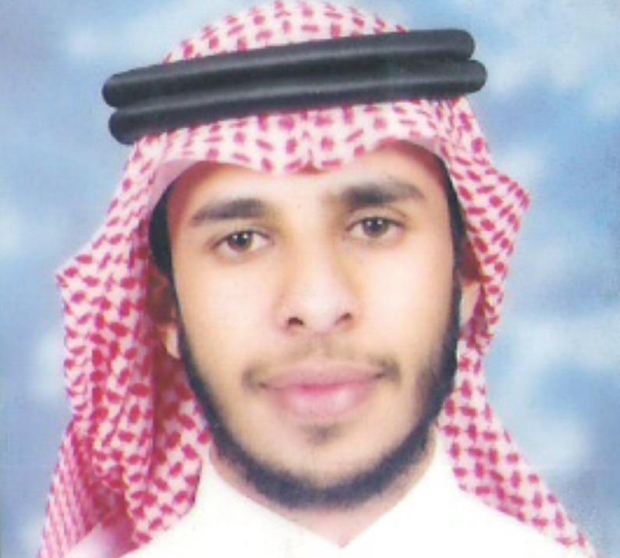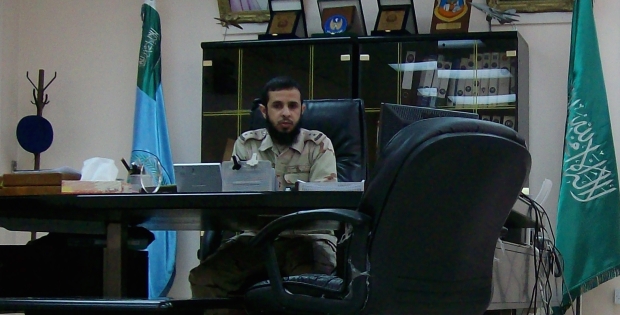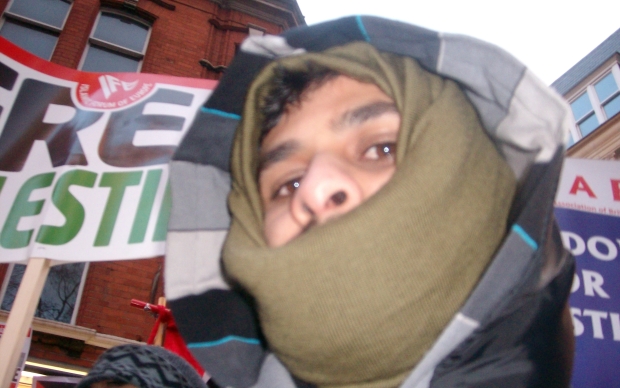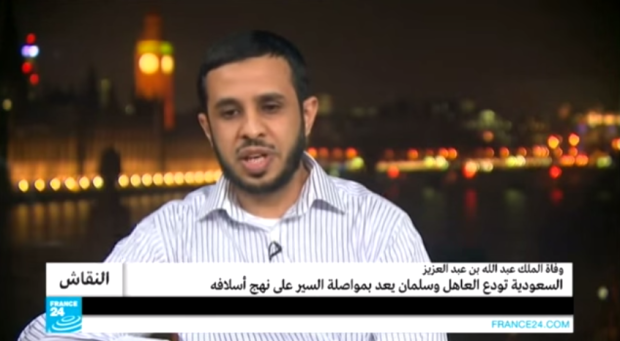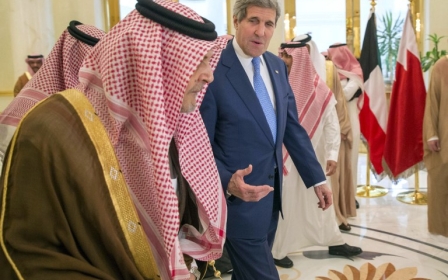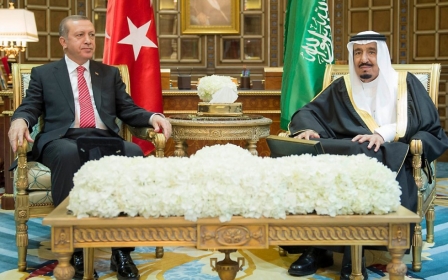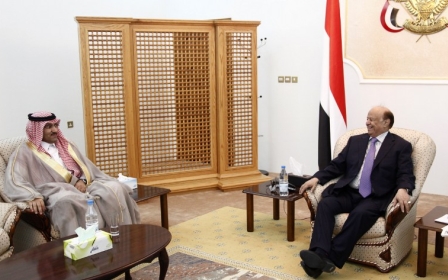The Saudi air force officer who became a human rights activist
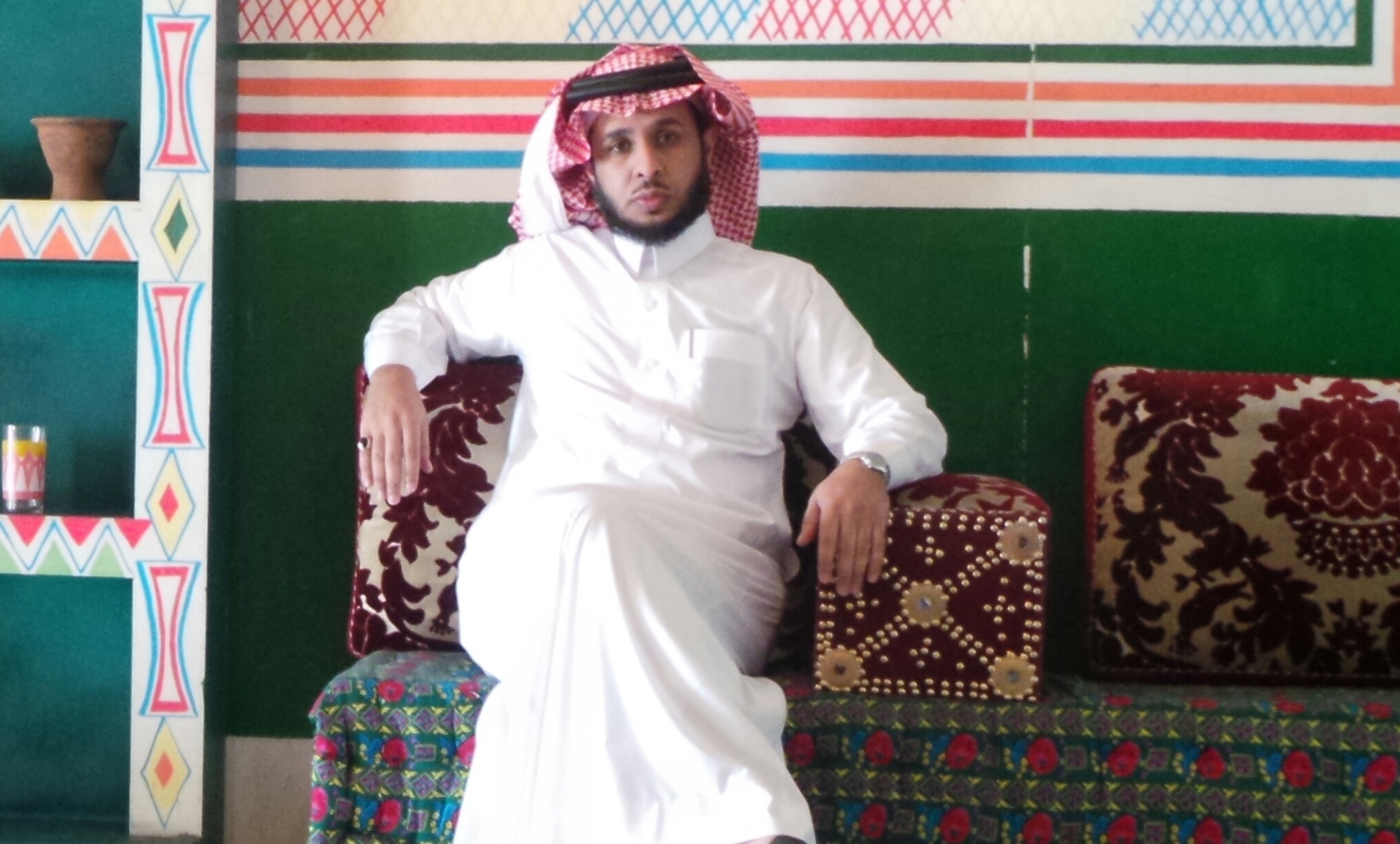
Yahya Assiri has sacrificed a lot for his values. Once a wealthy air force officer in Saudi Arabia, he now lives as a political refugee in the United Kingdom, running his own human rights group through an underground network of activists back at home.
He spent years living a double life in Saudi Arabia. By day he would work on international arms deals for the Saudi military but by night he would be in online forums discussing problems of poverty, unemployment and repression. It was a dangerous life and as Yahya watched activists arrested around him, he knew he would either end up in prison or be forced to flee – the latter proving the more appealing choice and leading him, his wife and two young children to their current home in Birmingham.
Smartly dressed, polite, and initially nervous Yahya sits down in MEE’s London office to tell his story. His unassuming demeanour belies a man steadfast in his idealism, forceful in his advocacy of human rights, and passionate about his belief in a better future for his country.
He begins by explaining familial roots. Yahya was born in 1980 in Asir province, a region in south-west Saudi Arabia where indigenous tribes fiercely resisted the 20th century unification of Saudi Arabia under the Wahhabi-allied al-Saud family.
Generational conflict was a key early experience for the young Yahya.
“My grandmother hated the regime. She said they were occupying the land and that Asir was a much better place to live before the spread of Wahhabism,” he says, referring to the ultra-conservative brand of Islam preferred by the Saudi Arabia’s rulers.
His father's generation, however, was one that benefited greatly from the oil-wealth dispersed by the royal family, which meant they felt quite differently about how the country was governed.
“My father's generation believed the government was helping the people because they had been given money. They [the people] didn’t know where this money had come from but it made them view the royal family favourably.”
These opposing views forced Yahya to ask lots of questions. At a young age his views reflected largely what was common at the time, that the biggest threat facing Saudi Arabia was Western culture, which would destroy the kingdom’s culture if allowed to spread.
After finishing secondary education at the age of 18, Yahya moved to the capital Riyadh and joined the royal air force with the aim of becoming a pilot.
“It was my dream to be a pilot from when I was a little boy,” he says with a smile that quickly turns to a look of disappointment.
After just 14 hours of flying he had failed the training and was told he could not be a pilot. But rather than leaving the military he successfully applied for a job in administration and graduated with a degree in logistics in 2004.
At this point human rights and politics were far from Yahya’s mind – material gain was his sole desire.
“I was only thinking about getting a good salary and a good position. That’s it.”
The next step in his life would prove key. Yahya moved to Taif, a city on the slopes of the Sarawat Mountains in Mecca province, where he would listen to the problems of the 300 men working in his squadron.
Most of his colleagues had bank loans, he says, and at the end of the month were left with no money.
“They would come to me and ask: Where is our money? Why is the royal family very, very rich and the people very, very poor?”
Yahya explains that 80 percent of the men in his squadron, some of who had been working for 30 years, were renting their home as they could not afford to buy their own.
Official statistics are hard to come by in the kingdom, but anger at perceived low salaries exploded in September 2013 on Twitter, when the hashtag “the salary is not enough” attracted millions of tweets. Home ownership in Saudi Arabia is estimated at 25 percent and youth unemployment is reported to be 29 percent for the 16-29 age range.
For Yahya, listening to his colleagues woes and witnessing poverty in Taif, at 24-years-old he began to ask questions internally about these issues.
“Why don’t the people have a voice? Why won’t the royal family share? Why can’t we express our opinion?” were the questions he asked himself. “I could only think about this alone. I knew if I discussed these issues with anyone I would go to prison.”
Yahya describes himself as a sensitive person, one who could not ignore the suffering around him despite his own comfortable life. He was progressing swiftly in the air force, rising to become a senior officer, which meant he was earning good money.
Able to resist the desire to speak out, the political debate remained internal. But in 2004, while exploring the internet one evening, Yahya found a series of websites and forums in Arabic where people were debating politics.
A political awakening
Without thinking about the risks involved, he set up an account under a pseudonym – Abu Fares, a name he had always liked, accompanied by a photo of a lion as his avatar.
The forums became a place for him to explore his political identity and debate politics with fellow Saudis. He expressed himself freely for the first time – writing articles that focused on poverty and unemployment.
“It was really exciting to express my opinion,” he says, adding that domestic politics and the Israeli occupation of the Palestinian territories were the most important issues for him at that time.
No one knew what he was doing, it was an entirely secret part of his life. This came to an end in 2005 when he got married to his wife, Jamila, who was the first person to become aware of his undercover political awakening.
“My wife used to get upset. She would get angry and say: ‘Nobody knows you, you’re wasting your time.’ But then she would read my articles and tell me: ‘Wow, I’m so proud of you. Keep going.’”
A year after getting married Yahya was ready to take bigger risks to get involved in politics. In the forums he had come across Saud al-Hashimi, a Saudi human rights activist who would later be arrested and jailed in 2011 for 30 years, convicted, falsely according to Amnesty International, of “supporting terrorism”.
Yahya heard Hashimi was opening a weekly public forum at his home in Jeddah. He attended five or six times, meeting special guests that included Palestinian Hamas leader Khaled Meshaal and Rashid Ghannouchi from Tunisia’s Ennahda movement. Participants attended anonymously, not sharing their names, only Hashimi would keep a record of who was present at the meetings.
Yahya describes Hashimi as a pivotal figure in his life, a man who he says had good relations with everyone in a pursuit to unite Saudi’s nascent, and factious, political opposition. Hashimi’s arrest in 2007 was like “a light being switched on” for Yahya, accusing the government of lying when they accused Hashimi of funding terrorism.
“I knew the accusation was false, Saud had appeared on state-television calling for donations to help Iraqis suffering as a result of the Americans’ war, and the government had used this to accuse him of funding terrorism.”
Yahya believes it was Hashimi’s ability to unite the underground political movements in Saudi Arabia that led to him being thrown in jail.
“His desire to unite people was really dangerous for the government. But it was really great for the people,” he says, accusing the government of a long-term policy to sow discord among the people, fostering sectarianism between Sunni and Shiites and encouraging divisions among liberals and Islamists.
Amidst the upset caused by Hashimi’s arrest, Yahya was still maintaining the veneer of being a good military officer at work and had earned enough money to buy a good family home. This proved useful as in 2007 his first child was born, a daughter, Lubna, followed quickly by a son, named Fares after his online pseudonym.
Despite having two young children and a stressful job in the air force Yahya kept up his online activities, living a double life reminiscent of Winston Smith in George Orwell’s iconic police state novel 1984.
“I was like two different people. During the day I was the air force officer and at 5pm I would go home, log on, and begin debating politics in the forums.”
There was a stark danger of arrest and this was brought sharply into focus one day at work at the end of 2008 when the air force intelligence summoned him for questioning.
“They asked me about Abu Fares.”
The intelligence officers said their civil counterparts had sent a letter asking about Yahya and whether he was writing about politics under the name Abu Fares.
“I was really frightened. I said I didn’t know what they were talking about,” knowing that if he were found out he likely faced a lifetime in prison.
Luckily, his exemplary record at work meant the officers believed his denials and told the civil intelligence Yahya was not the man writing under the Abu Fares pseudonym. It was a near miss.
Shortly after being summoned by the intelligence Yahya was given respite from what was becoming a suffocating situation when he was chosen to work on a lucrative deal between Saudi Arabia and British arms company BAE Systems.
Protesting in London
He travelled to the UK at the beginning of 2009 for 18 months training in logistics in relation to his country’s order for 72 BAE-produced Typhoon war jets worth £4.5bn. In London he considered meeting Saudi dissidents living in exile but concluded, without naming names, that the dissidents were too concerned with infighting.
He also found their political persuasion - be it liberal or Islamist – unappealing. Yahya doesn’t put himself in a category when it comes to politics, preferring instead to stick to two core principles.
“I strongly believe in democracy and human rights. But I also strongly believe there is no conflict between those values and Islam.”
While he has sought out a Saudi movement to join that upholds these principles he says: “There hasn’t yet been a political movement in my country that I identify with.”
Although he was disappointed to find no cogent political opposition in London, Yahya took the opportunity to join in with protests in the UK, as his arrival had coincided with a deadly three-week Israeli assault – known as Operation Cast Lead - on the Gaza Strip that left some 1,400 Palestinians dead.
Thousands of miles from home, far from the physical reach of the Saudi authorities, Yahya remained frightened of the ramifications of taking part in a public demonstration and covered his face at the London march.
“It didn’t matter that it was a protest for Palestine,” a cause his government publicly backs. “Demonstrating is forbidden in our country. If you participate in a protest in London, the government worries you’ll like it and bring it back home.”
Beyond the new experience of public protest Yahya was enjoying the training with BAE, and when the time came to return home, he requested to stay on and study for a post-graduate degree in logistics at Lincoln University.
His request was refused by the air force. They told him he “had his chance” and others should be given the opportunity for an overseas posting, so in mid-2010 he returned to Saudi Arabia.
For the next two years Yahya struggled with returning to his old life of being an air force officer in the day and an unknown online political dissident at night. Eventually he managed to resign from the air force in 2012 and his first decision after leaving was to change his online avatar from Abu Fares to Yahya Assiri, replete with a photo of himself instead of a lion.
He did this because he had become tired of living a secret life. This decision came with a cost; he now expected to be investigated and arrested, potentially facing a lengthy prison term.
No knock at the door came, however, and after failing to find a new job at home, which he says may have been down to rumours about his political activities, he found a course in human rights at Kingston University in London.
So, after successfully applying for the course, Yahya and his young family left for the UK at the beginning of 2013. He travelled on a student visa, still hoping to return to Saudi Arabia on completion of his degree, since, although people were being arrested, he knew some of his activist friends were being allowed to operate, albeit under surveillance.
But while studying human rights at Kingston the situation in Saudi Arabia for activists was swiftly deteriorating. Yahya watched on as numerous people he knew were sentenced to lengthy jail sentences.
In March 2013 Mohammed Fahad al-Qahtani and Abdullah Hamid Ali al-Hamid – founding members of the Saudi Civil and Political Rights Association – were sentenced to 10 and 11 years in prison respectively on charges that included “breaking allegiance with the ruler”.
The severe sentencing of human rights activists led Yahya to consider seeking political asylum in the UK, a decision that was confirmed when his close friend and fellow human rights activist Waleed Abu al-Khair was arrested in April 2014.
Not only was Yahya distraught by the arrest of Abu al-Khair, a man he describes as “incredibly brave” - it was news passed to him by fellow activists at the time that meant it would be difficult for him to avoid jail on return to Saudi Arabia.
“Friends told me the security forces were asking about me. They were asking people if I would come back from the UK. I knew then that I couldn’t return.”
Starting a new life in the UK
Yahya applied for asylum in the UK the same month as Abu al-Khair was arrested. Almost a year later he is still waiting to hear if his application has been accepted.
Despite living in limbo he remains confident the UK will accept him as a refugee, one whose safety would be in danger should he be returned home, but life is far from the luxurious one he enjoyed as an air force officer.
Not permitted to work, no salary and savings exhausted, Yahya has had to rely on state welfare to provide him with a home and small income. It has proved difficult to adjust for the family.
“We used to be rich. We used to have good cars, a nice home in Saudi Arabia. Now we are here in the UK, as refugees, and we are living on state welfare. We have nothing.”
The sacrifices remain worthwhile for Yahya, however, and the fight for human rights is one he continues to pursue with passion. He set up his own human rights group in August 2014 named Al Qst, a name he chose carefully to ensure Saudis would understand his goals.
Yahya says the authorities usually dismiss international human rights groups as trying to impose Western values on the conservative kingdom, which is why he chose the name Al Qst, which is a Quranic term meaning justice.
“I used this name to speak to the people. The name comes from our religion, so no one could say my human rights organisation is an attack on the culture of our people.”
The organisation is voluntarily run, although Yahya is currently seeking funding for it, and he uses a vast underground activist network at home to keep up to date with developments. He has eight groups on the messaging application Telegram covering different topics including women’s rights, poverty and specific regional issues.
On Twitter the organisation already has 42,000 followers, after only 100 tweets, and Yahya’s plan is to build the exclusively Saudi-run initiative into a strong civil society organisation.
“I believe Al Qst will become the most important organisation dealing with human rights in Saudi Arabia. This is because we – the Saudis – are the best people to understand the complicated problems facing our country.”
He uses the example of the death penalty to explain what his approach is to human rights advocacy. Yahya says while the death penalty is set down in the Quran for specific crimes, the punishment is supposed to deter people from breaking the law, not to be used for killing swathes of prisoners.
He points to the soaring use of the death penalty in Saudi Arabia: 40 people have already been executed in 2015. Eighty-seven people were executed in 2014, up from 78 the previous year, and Yahya believes an alternative must be sought as the threat of death is not deterring criminal acts.
“We want the people to know human rights values are not against the Quran. We want them to understand that this punishment (the death penalty) was designed to deter criminal activity but in Saudi Arabia a large number of crimes are still being committed. If the crime can’t be stopped by using this deterrent we need to think what's wrong? Individuals are often executed in Saudi Arabia without fair trials. This injustice is related to the regime and not the Quran."
Yahya believes the government is intimidated by this approach to human rights, one that appeals to the people and is harder to discredit with arguments of a Western cultural attack.
“I have something new to say. I know the government will fight with me. But this is not a problem,” he chuckles.
On social media Yahya has been attacked by what he says are government-operated troll accounts, particularly after he appeared on France 24 television when he attacked various alleged human rights violations taking place in Saudi Arabia.
After the interview the hashtag “Yahya Assiri represents the people” swiftly became popular. The next day, however, the hashtag was swamped with abuse directed at Yahya, from mostly anonymous Twitter accounts, and he believes the government was behind hijacking support for him.
The government’s clout goes beyond alleged social media abuse, Yahya says, and he acknowledges the royal family is strong and he knows they have maintained enduring relationships with powerful Western allies.
And yet he remains hopeful for the future, pinning his optimism on a younger generation that has access to information – through the internet – in new ways that have made them less likely to accept a status quo where unemployment is high and poverty widespread.
“The situation as it stands will not continue. The people will not be silent for much longer. The old generation were silent because they didn’t have the tools to communicate. Now we have the tools and the new generations is filled with really angry people.”
This anger, he says, has even reached those made extremely wealthy by the government. He refers to a “very famous” Saudi poet – one he will not name – and says this man, who has “close” ties with the government, told him he is “fed up” with the rulers.
“The people are angry – even those made wealthy by the government.”
When pressed on whether there will be structural change in Saudi Arabia within the near future, Yahya pauses, thinks carefully, and answers in a confident manner.
“Change is coming, I believe, in the next five or 10 years. There either needs to be real reform or the people will remove the royal family.”
New MEE newsletter: Jerusalem Dispatch
Sign up to get the latest insights and analysis on Israel-Palestine, alongside Turkey Unpacked and other MEE newsletters
Middle East Eye delivers independent and unrivalled coverage and analysis of the Middle East, North Africa and beyond. To learn more about republishing this content and the associated fees, please fill out this form. More about MEE can be found here.


